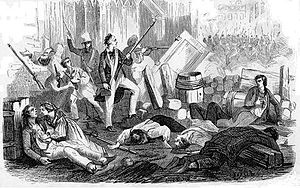
Back تمرد يونيو Arabic Emsavadeg republikan Pariz e miz Even 1832 Breton Rebel·lió de juny Catalan Republikánské povstání v Paříži Czech Juniaufstand 1832 German Ιουνιανή Εξέγερση Greek Insurrección de junio de 1832 en París Spanish Ekaineko Matxinada Basque Insurrection républicaine à Paris en juin 1832 French המרד הרפובליקני בפריז של יוני 1832 HE
| June Rebellion | |||||||
|---|---|---|---|---|---|---|---|
 An 1870 illustration depicting the rebellion | |||||||
| |||||||
| Belligerents | |||||||
|
| ||||||
| Commanders and leaders | |||||||
|
|
| ||||||
| Strength | |||||||
| 30,000 | 3,000 | ||||||
| Casualties and losses | |||||||
| 73 killed, 344 wounded[1] | 93 killed, 291 wounded[1] | ||||||
| History of France |
|---|
 |
| Topics |
| Timeline |
|
|
The June Rebellion, or the Paris Uprising of 1832 (French: Insurrection républicaine à Paris en juin 1832), was an anti-monarchist insurrection of Parisian republicans on 5 and 6 June 1832.
The rebellion originated in an attempt by republicans to reverse the establishment in 1830 of the July Monarchy of Louis Philippe, shortly after the death of the King's powerful supporter and President of the Council, Casimir Pierre Périer, on 16 May 1832. On 1 June 1832, Jean Maximilien Lamarque, a popular former Army commander who became a member of the French parliament and was critical of the monarchy, died of cholera. The riots that followed his funeral sparked the rebellion. This was the last outbreak of violence linked with the July Revolution of 1830.
The French author Victor Hugo memorialized the rebellion in his 1862 novel Les Misérables, and it figures prominently in the stage musical and films that are based on the book.
- ^ a b Duckett, William (ed.). Dictionnaire de la conversation et de la lecture (in French). Vol. 11. p. 702.
© MMXXIII Rich X Search. We shall prevail. All rights reserved. Rich X Search